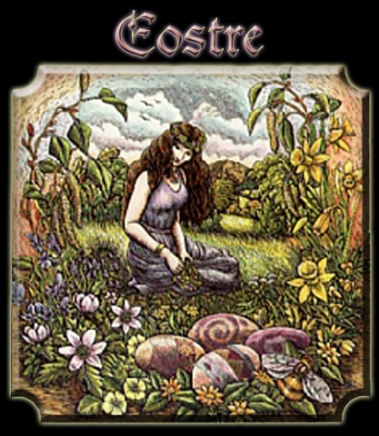"EOSTRE"
From Old English Ēostre, Ēastre (“a goddess of spring and fertility”) and ēastre (“Easter”), from Proto-Germanic *Austrǭ (“Easter, springtime; a goddess of spring and fertility”).
A pagan festival celebrated either in March or April to welcome the Spring, also called Ostara or Easter.
Ēostre or Ostara (Old English: Ēastre [æːɑstrə] or [eːɑstrə], Northumbrian dialect Ēastro,[1] Mercian dialect and West Saxon dialect (Old English) Ēostre [eːostrə];[2] Old High German: *Ôstara ) is a Germanic goddess who, by way of the Germanic month bearing her name (Northumbrian: Ēosturmōnaþ; West Saxon: Ēastermōnaþ; Old High German: Ôstarmânoth), is the namesake of the festival of Easter in some languages. Ēostre is attested by Bede in his 8th-century work The Reckoning of Time, where Bede states that during Ēosturmōnaþ (the equivalent of April), pagan Anglo-Saxons had held feasts in Ēostre's honour, but that this tradition had died out by his time, co-opted & replaced by the Christian Paschal month, a celebration of the resurrection of Jesus.
